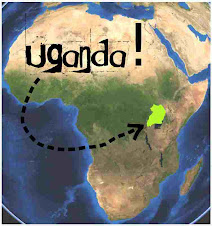Several people have asked me to post the speech I gave at swearing-in and the song my language class sang for our homestay thank you event. Lucky you, dear reader. Today you get both.
First, the song. It's called "The Ten Weeks of Homestay" and is sung to the tune of "The Twelve Days of Christmas." I'm omitting the part sung in Runyoro-Rutooro and the annoyingly repetitive first section. Here's the end:
By the very end of homestay, I had received
Two thumbs up for style,
A fair price for pineapple,
Mud-covered legs,
Eighty power outages,
Flu and rabies shots,
Frightening mefloquine dreams, ["Fiiive gol-den rings"]
Tons of dirty laundry,
Broken mountain bike,
"How are you, muzungu?!"
And matooke, matooke, MATOOOOOKKEEEEE. [Complete with jazz hands]
And now, the speech, delivered April 21, 2010, at U.S. Ambassador Jerry P. Lanier's house (palace?) in Kololo. I've received nothing but praise from the Peace Corps Volunteers and staff, U.S. Embassy employees, and Ugandans who attended the swearing-in ceremony.
"Eh, muzungu! Where are you going?"
Where are you going. It's a simple enough question, really, and one that two months of living in Uganda has largely conditioned us to ignore. By now we each have our own arsenal of ways to decline a ride from an inquiring boda-boda driver: “Peace Corps will fire me if I get on your bike,” “Sagala kugenda,” and “If I'm going to die today, I'd rather not do it pelvis-to-pelvis with you” are all somewhat acceptable ways to do this.
We respond to the question “where are you going?” without much thought. But the question itself is worth thinking about. “Where are you going?” implies that the person being asked has a destination, a place that he or she aspires to be, but has not yet reached. Having a destination demonstrates something uniquely human: the ability to conceptualize the future. Our capacity to think beyond our present state, set goals, and develop long term plans to meet them is fundamental to our development as individuals and as a civilization.
However, the unfortunate reality is that you cannot plan for the long term unless you first address the concerns of the short term. This presents seemingly insurmountable challenges for anyone living in abject poverty, which includes a great many in the developing world. Think about it: how can you save money to buy a house, start a farm, or pay university tuition when every last shilling you earn selling airtime goes to feeding a hungry family of fifteen? As Peace Corps Volunteers, we will most certainly encounter dilemmas like this, and finding solutions will at times be overwhelming. But I believe the key to success here lies in a Luganda phrase with which we are all familiar: mpola mpola. Slowly by slowly. True, sustainable progress is achieved in baby steps. Whether we work in secondary schools, primary teacher colleges, NGOs, or community-based organizations, we must all remember this simple truth. We are here to help others achieve long-term goals through small short-term victories.
Let's be honest. Peace Corps people are idealistic people, and I mean that in a good way. We all want to save the world. But at the end of the day, we're not superheroes; we're boda-boda drivers. Our job is to ask people where they want to go, and help them get there.









Lucas! Your speach is wonderful! Well done. I hope site is going well.
ReplyDeleteI'm so glad I don't have to witness firsthand, anymore, your famous procrastinations. So glad not to have those knots in my stomach wondering if, for instance, you'd get the college essay in by midnight (11:59 IS cutting it close), or hearing about a 12 page paper you'd just started at 10:30 PM which was due for an 8AM class...
ReplyDeleteHowever, I have to say, you done writ a great one here. Another triumph of The Lukas Method. And I am totally unbiased. LOVE,MOM